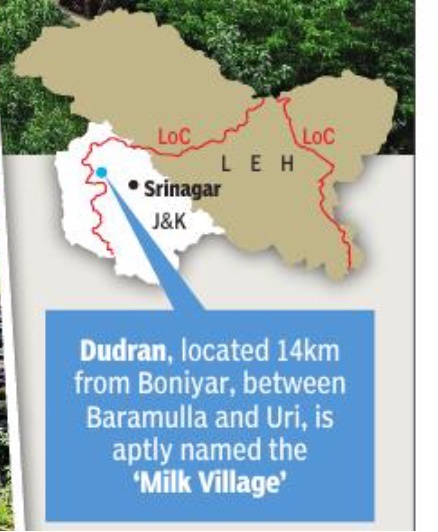Dudran, the milk village
This is a collection of articles archived for the excellence of their content. |
A backgrounder
As in 2024
Saleem Pandit, August 3, 2024: The Times of India

From: Saleem Pandit, August 3, 2024: The Times of India
Srinagar : Some places milk tradition, others go with the flow, and a few like Dudran own and embrace it every day, unfettered by modernity and motive.
This tiny, picture-postcard village in J&K’s Baramulla district lives life the old-fashioned way — just as its sylvan span ringed by mountains, cattle grazing on the meadows, and cottages alongside streams evoke the imagination of a childhood painting.
What lies beneath the veneer of this idyllic existence is a story of native ingenuity as fascinating in its origins as in its sustainability.
Dudran, as the name suggests, is a “milk village” rooted in the hoary traditions of cattle rearing and dairy dating back centuries.
Each of the 70-odd households in this hamlet 14km from Boniyar in Uri, a border landmark steeped in mythology yet more famous for its link to the 2016 surgical strikes on terrorist camps in Pakistan, has been engaged in dairy farming for generations.
The bulwark of this pastoral legacy is the doud khot, the Kashmiri term for small vault-like structures built with stones and planks of wood along the path of natural springs and meant to function as refrigeration systems without electricity. “The doud khots are unique to us, based on the wisdom of our ancestors,” dairy farmer Zahoor Ahmad Lone tells TOI. “Dudran is not just a village. It’s a repository of culture. We take pride in producing the finest dairy products — milk, cheese, butter or curd — using traditional methods.” The doud khots dotting Dudran’s landscape not only help store milk and other dairy products for days without spoiling, they also safeguard the stock against intrusions by wandering wildlife.
Fatima Bibi, 50, earns around Rs 15,000 a month after accounting for all recurring expenses of her family trade. She attributes the quality of milk that Dudran produces to the abundance of pastures that keep cattle healthy without having to rely on supplements. “Each household in the village gets a yield of 10-15 litres of milk a day, which is decent,” she says. Summers are the most productive. Using a wooden contraption, milk stored in aluminium pots inside the doud khots is curdled repeatedly to produce butter in the ageold tradition of “gurus mandun”. In local parlance, gurus means buttermilk.
Abdul Razaq Dar, 54, is among the proud practitioners of this system that has survived the ravages of change. “The knowledge handed down generations has served us well, and we see no reason to do anything different,” he says.